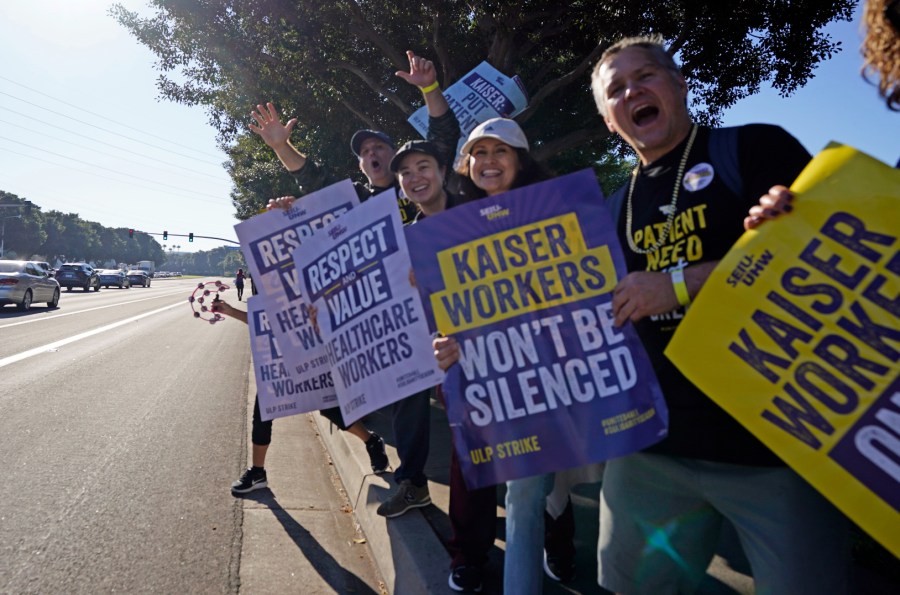More than 75,000 Kaiser Permanente workers walked off the job Wednesday morning, marking what is being called the largest health care strike in U.S. history.
Negotiators between the Coalition of Kaiser Permanente Unions and the health care provider are ongoing and apparently making progress, but workers still opted to walk off the job for a scheduled three-day labor stoppage.
The strike officially began at 6 a.m. in Southern California. Workers began to picket a few hours earlier on the East Coast.
Nurses, technicians and support staff at hundreds of hospitals across multiple states are striking against what they call unfair labor practices and unfair working conditions that are affecting the quality of patient care.

“We just can’t go on with this staffing crisis,” one worker preparing to picket outside the Kaiser hospital in North Hollywood said Wednesday morning.
Workers are demanding a 6.5% pay raise, protections against outsourcing and subcontractors, as well as a medical plan for retired employees.
As of now, the strike is set to end Saturday with workers in Southern California returning to the hospitals by 6 a.m.
Kaiser Permanente is the largest nonprofit health care provider in the U.S. It reported profits topping $3 billion in the first six months of 2023, according to the Associated Press.
SEIU-United Healthcare Workers West announced on Sept. 14 that 98% of its members voted to approve the Oct. 4-6 strike in protest of “unfair labor practices.”
On Tuesday night, Kaiser Permanente said in a statement:
“Bargaining between Kaiser Permanente and the Coalition of Kaiser Permanente Unions is ongoing, and several agreements over specific provisions have been reached. Our team is available 24/7 to continue bargaining with the Coalition until we reach a fair and equitable agreement. We remain optimistic that there is still time to find agreement before any of the work stoppages called by the Coalition unions begin at 6 a.m. on Wednesday.”
A Kaiser executive told KTLA that in Southern California, all hospitals and emergency rooms will remain open during the strike. Pharmacies will also stay open and Kaiser Permanente officials said they are working to keep urgent care centers in operation.
On Wednesday night, no agreement was reached as negotiators continued speaking. Kaiser released a statement saying in part:
“While we have not reached a contract settlement, we have been able to reach a number of tentative agreements in bargaining, and our offers to date address the unions’ priorities, including:
-Across-the-board wage increases in all markets over the next four years.
-Updating the Performance Sharing Plan to include a minimum payout opportunity and potential for up to a $3,750 payout.
-Continuing and enhancing our existing excellent health benefits and retirement income plans.
-Renewing our strong tuition assistance and training programs, and increasing funding of the education trusts












